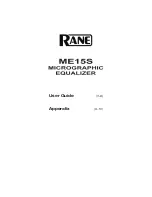
Manual-
REAR PANEL DESCRIPTION
1
XLR INPUT connector.
This is a fully differentially balanced Input, connected such that pin 2 is hot “+”, pin 3 is return “–” and
pin 1 is chassis ground. For unbalanced operation, drive pin 2 as hot, and pin 3 as return. For grounding and shielding informa-
tion, consult the RaneNote 110, “Sound System Interconnection” section for expanded details.
2
XLR OUTPUT connector.
Again, a fully differentially balanced socket, pin 2 is hot “+”, pin 3 is return “–” and pin 1 is chassis
ground. Balanced output configuration should use only pins 2 and 3. Ground is not required in this mode. Use the case for shield.
If unbalanced operation is your cup of mud, use pin 2 as hot and pin 1 as return or ground
unless your are running unbalanced out-
put in the TRANSFORMER
coupled mode, then you must short pins 1 & 3 together
.
This is not recommended, however, for the active
unbalanced mode. Again, see the “Sound System Interconnection” section for further clarification.
3
Screw terminal INPUT and OUTPUT connector.
These #6 terminals directly parallel the pins in the XLR Input and Output
connectors. Their use or disuse is completely up to the judgement of the installer.
4
OUTPUT MODE switch.
Pressing this switch
in
to its locked position places the output stage into its TRANSFORMER
COUPLED balanced mode, and illuminates the yellow LED. Pressing the switch again to release it from its
in
position causes the
GE 30 to be placed back into its ACTIVE balanced output mode, extinguishing the yellow LED and lighting the green LED.
5
EQ MODE switch.
Pressing this switch to its
in
and locked position selects the CUT-ONLY mode, a fact attested to by the
CUT-ONLY LED indicator on the front panel. Pressing the switch again to release it to its out position places the unit back into
the BOOST/CUT mode, which reconfigures the LEDs on the front panel.
6
Remote power supply input.
Use only an RS 1 or other remote AC power supply approved by Rane
. The GE 30 is supplied from the
factory with a remote power supply suitable for connection to this input jack.
It is not a telephone jack.
The power requirements of
the GE 30 calls for an 18-24 volt AC center-tapped transformer only.
7
Chassis ground point.
A #6-32 screw is used for chassis grounding purposes. See the note below.
CHASSIS GROUNDING
If after hooking up your system it exhibits excessive hum or buzzing, there is an incompatibility in the grounding configuration
between units somewhere. Your mission, should you accept it, is to discover how your particular system wants to be grounded. Here
are some things to try:
1. Try combinations of lifting grounds on units that are supplied with ground lift switches or links.
2. If your equipment is in a rack, verify that all chassis are tied to a good earth ground, either through the line cord grounding pin or
the rack screws to another grounded chassis.
3. This unit’s outboard power supply does not ground the chassis through the line cord. Make sure that this unit is grounded either to
another chassis which is earth grounded, or directly to the grounding screw on an AC outlet cover by means of a wire connected to
a screw on the chassis with a star washer to guarantee proper contact (see #7 above).
Please refer to the RaneNote, “Sound System Interconnection” included with this manual for further information on system
grounding.






















